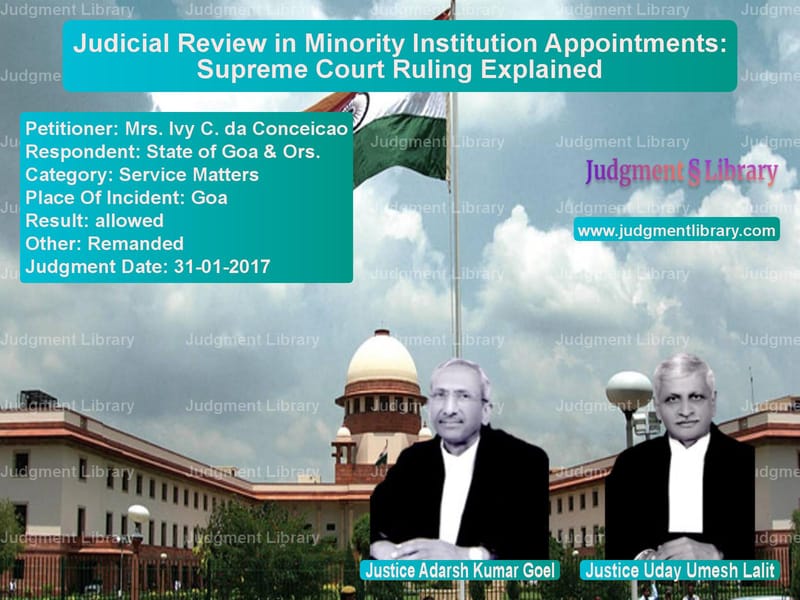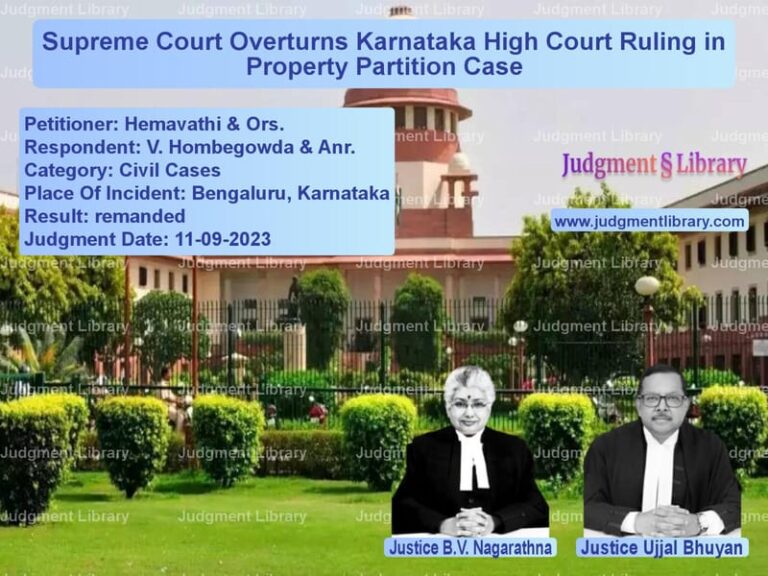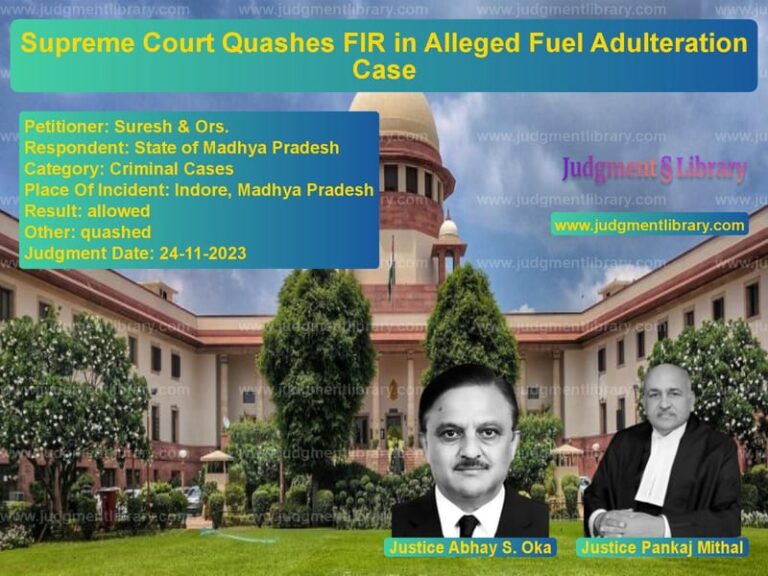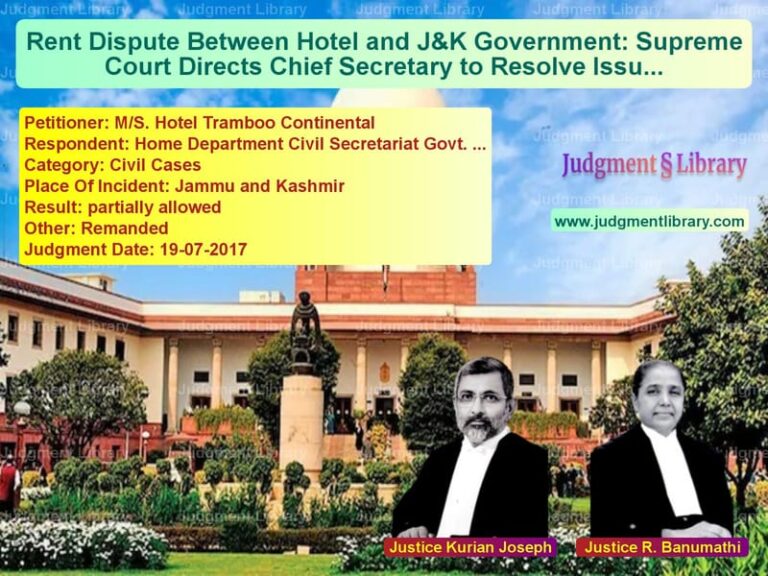Judicial Review in Minority Institution Appointments: Supreme Court Ruling Explained
Introduction
The case of Mrs. Ivy C. da Conceicao v. State of Goa & Ors. raised an important constitutional question regarding the extent of judicial review in the appointment of principals in minority educational institutions. The Supreme Court’s judgment clarified that while minority institutions enjoy autonomy under Article 30 of the Indian Constitution, their decisions must be transparent, non-arbitrary, and fair. This case explores the balance between minority rights and the fundamental principles of equality and fairness enshrined in the Constitution.
Background of the Case
The appellant, Mrs. Ivy C. da Conceicao, had been a Grade-I teacher at Rosary Higher Secondary School in Goa for over two decades. She held multiple qualifications, including a Bachelor’s degree in Economics and Commerce, a Master’s degree in Economics, and a Bachelor of Education (B.Ed.). Having served as an in-charge principal on multiple occasions, she considered herself a prime candidate for the post of principal when vacancies arose.
However, despite her seniority and qualifications, the respondent institution—Diocesan Society—appointed individuals junior to her for the position of principal in different schools under its management. The appellant challenged these appointments, arguing that they violated the rules governing recruitment and promotion in aided educational institutions in Goa.
Legal Issues Raised
The core question before the Supreme Court was whether the process of appointing a principal in a minority institution is subject to judicial review and, if so, on what grounds. The appellant contended that the selection process lacked fairness and transparency, while the respondents claimed their right to appoint candidates of their choice under Article 30 of the Constitution.
Arguments by the Appellant
- The appellant argued that she was the most competent candidate based on seniority, experience, and qualifications.
- She contended that her exclusion was arbitrary and unfair, violating her fundamental rights under Articles 14, 16, and 21 of the Constitution.
- She emphasized that while minority institutions have autonomy, their decision-making must align with principles of fairness and non-discrimination.
- She cited Rules 74 and 86 of the Goa School Education Rules, 1986, which mandate that vacancies be filled through a structured and merit-based selection process.
Arguments by the Respondents
- The respondent institution asserted its right under Article 30 to appoint a principal of its choice.
- It claimed that minority institutions are not bound by general rules governing recruitment and promotion in aided institutions.
- The respondents cited the Supreme Court’s ruling in Secy. Malankara Syrian Catholic College v. T. Jose, which upheld the right of minority institutions to make appointments independent of seniority considerations.
- They argued that judicial interference in appointment decisions would infringe upon their constitutional autonomy.
Decision of the High Court
The Bombay High Court at Goa ruled in favor of the respondents. It held that a minority educational institution has the right to appoint a qualified candidate of its choice as a principal. The court stated:
“The necessary sequitur is that the challenge of the petitioner that DPC was not properly constituted or that some of the appointees do not come within the zone of consideration, are irrelevant for the purpose of deciding the issues involved in the present petition.”
Thus, the High Court dismissed the appellant’s petition, holding that the appointments made by the respondent institution did not warrant judicial interference.
Supreme Court’s Ruling
The Supreme Court disagreed with the High Court’s conclusions. While acknowledging the autonomy of minority institutions under Article 30, the court held that such autonomy does not grant them the right to act arbitrarily or unfairly. The Supreme Court stated:
“While under the constitutional scheme, a ‘minority institution’ is free to select and appoint a principal without being bound by the principle of seniority alone, whether the appointment has been made fairly and reasonably and whether there is a violation of the right of an individual eligible candidate by the minority institution by not adopting fair procedure, is liable to be tested in exercise of power of judicial review under Article 226 of the Constitution.”
The court emphasized that judicial review remains available to ensure that decisions made by minority institutions are transparent and adhere to principles of fairness and equality.
Key Takeaways from the Judgment
- Minority institutions have autonomy in appointing principals, but their decisions must be fair and reasonable.
- The right to administer does not include the right to maladminister.
- The judiciary has the authority to intervene if a selection process is found to be arbitrary or discriminatory.
- Appointments in aided minority institutions must align with statutory rules and constitutional principles.
Impact of the Judgment
The Supreme Court’s ruling has significant implications for minority institutions across India. It reaffirms the principle that while minority institutions enjoy autonomy, they are still subject to judicial scrutiny. The judgment also ensures that eligible candidates are not unfairly excluded from consideration for appointments.
Conclusion
The Supreme Court’s ruling in Mrs. Ivy C. da Conceicao v. State of Goa & Ors. strikes a balance between the rights of minority institutions and the principles of fairness and non-arbitrariness. While minority institutions retain their autonomy in appointments, they must adhere to a reasonable and transparent selection process. The judgment serves as a crucial precedent in ensuring that minority rights do not override fundamental principles of justice and equality.
Don’t miss out on the full details! Download the complete judgment in PDF format below and gain valuable insights instantly!
Download Judgment: Mrs. Ivy C. da Conce vs State of Goa & Ors. Supreme Court of India Judgment Dated 31-01-2017.pdf
Direct Downlaod Judgment: Direct downlaod this Judgment
See all petitions in Employment Disputes
See all petitions in Judgment by Adarsh Kumar Goel
See all petitions in Judgment by Uday Umesh Lalit
See all petitions in allowed
See all petitions in Remanded
See all petitions in supreme court of India judgments January 2017
See all petitions in 2017 judgments
See all posts in Service Matters Category
See all allowed petitions in Service Matters Category
See all Dismissed petitions in Service Matters Category
See all partially allowed petitions in Service Matters Category







